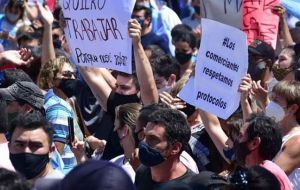MercoPress. South Atlantic News Agency
Argentines defy lockdown and stage protests nationwide against President Fernández
 The so-called sanitary measures lose all credibility when a 22-year-old diabetic girl dies in the streets. (Pic credit Claudia Sanchez mother of Lara Arreguiz)
The so-called sanitary measures lose all credibility when a 22-year-old diabetic girl dies in the streets. (Pic credit Claudia Sanchez mother of Lara Arreguiz) Street protests against the Government were recorded in most Argentine cities Tuesday, particularly around Buenos Aires' iconic Obelisco, but also outside the Olivos presidential residence to signal the people's disapproval of the newer restrictions on sanitary grounds.
The larger anti government crowds gathered in Córdoba, Tucumán and Rosario, where the police repressed an antiquarantine group and detained about 30 people
President Alberto Fernández last week issued an emergency decree (DNU) mandating 9 days of strict confinement which will remain in force until May 31.
It was a national holiday in Argentina, one associated with a freedom that seems foregone.
On May 25, 1810, the people of the City of Buenos Aires decided that with King Fernando VII held hostage by Napoleon, the local viceroy was representing nobody and if people in Spain had theit own self-appointed governments in the name of the monarch, the citizens of the colonies could do the same. It was the beginning of the road to independence and hence the national holiday.
But May 25, 2021, found the people of Buenos Aires (and in the rest of the country) in strict confinement due to sanitary measures taken by a government voted by the people, which in the name of a threatening virus, chose to bow to the word of epidemiologists and sink one of the world's worst economies into further recession.
The so-called sanitary measures lose all credibility when a 22-year-old diabetic girl dies in the streets in the province of Santa Fe unattended by the health system and, needless to say, unvaccinated.
A 30-day ban on beef exports to protect local consumers from the effects of worldwide demand has led to additional shrinking in the amount of meat available and therefore prices went up nonetheless.
In other words, the permanent trial and error (or error after error rather) policies of President Alberto Fernández with no achievements other than those obtained through terror and repression have resulted in more and more people having nothing to lose, which is why in defiance of lockdown measures demonstrations were recorded in every city and town nationwide.
Some were merely demanding the right to work and others were just as peaceful but more radicalized like the one in Rosario organized by Argentine Doctors for Truth, which ended up in over 30 arrests as off-mainstream scientists opposing the World Health Organization (WHO) gathered support in their campaign against vaccines and in favor of other covid-19 treatments.
As businesses close and people lose their sources of income while vaccines continue to be scarce compared to neighbors Chile and Uruguay, coupled with news of compulsory concentration camp-style confinements in the province of Formosa against all those suspected of having been in close contact with a positive case of covid-19, the airs of a much celebrated democracy recovered from a military dictatorship in the early 1980s are fading away.
What lies ahead seems to be a scenario resembling that of Colombia over the past month. At least it is not to be ruled out. It will all depend on Fernández's decisions in the next couple of weeks.
On Tuesday Argentina reported 576 deaths due to covid-19 and 24,601 new infections in the past 24 hours
Excessive police repression was reported during the Rosario arrests. Police officers fired rubber bullets to disperse those protesting against the restrictions without maintaining social distance or complying with preventive measures such as the wearing of the mask.
Among those arrested was Doctor Mariano Arriaga. The group he leads questions the existence of the pandemic and opposes the preventive and restrictive measures of the Fernández government.
Hundreds gathered in downtown Córdoba. “There is a lack of vaccines due to corruption. They have us locked up because they can't come up with anything different,” said a young protester quoted by local media. “The virus is deadly, but so is the government,” said a woman who identified herself as a pediatric nurse.
Business owners have announced they would open their stores Wednesday. They are gradually disregarding the presidential decree, which shall lead to either further police repression or to the whitewashing of whatever little legitimacy President Fernández seems to have left.
In Tucumán, thousands marched through the Plaza Independencia, in downtown San Miguel de Tucumán, the province's capital. Demonstrators broke through the fences set up by the police to protest against the restrictions. Some bars were open despite the measures allegedly in force.
And in Buenos Aires, hundreds gathered around the Obelisco as vehicles passed by covered in Argentine flags marking the national holiday. Most demonstrators addressed two issues: the lack of vaccines and the need to work. “If I do not work, I do not eat,” read one banner.
The opposition protesters also carried a doll representing Vice President Cristina Kirchner in a prisoner's suit as in previous protests.
And at the gates of the presidential residence in the Olivos neighborhood just outside the Autonomous City of Buenos Aires, people lighted candles and carried Argentine flags amid applause and the rattling of saucepans (cacerolazos).





Top Comments
Disclaimer & comment rules-

Read all commentsWhat happened to the (unusually rational) previous comment about the source of the accompanying picture?
May 27th, 2021 - 02:58 pm 0Commenting for this story is now closed.
If you have a Facebook account, become a fan and comment on our Facebook Page!